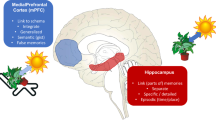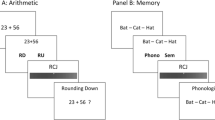Abstract
Developmental studies assessing the impact of domain-specific knowledge on memory are discussed. In the first section of the review, different ways through which domain-specific knowledge relates to strategy use in memory tasks are briefly summarized. Empirical evidence indicating nonstrategic effects of the knowledge base are discussed next. In particular, findings based on the expert-novice paradigm are used to compare the knowledge structure and memory performance of experts and novices of different ages, and to explore how individual differences relate to the acquisition and use of domain-specific knowledge. The review shows that domain-specific knowledge permits children to process and remember domain-related information more efficiently, apply strategies more effectively, and integrate novel information more easily than domains for which they have less detailed knowledge. If the knowledge base is particularly rich, it exerts a greater influence than other sources of memory development (i.e., memory capacity, strategies, and metamemory) combined.
Similar content being viewed by others
References
Best, D. L., and Ornstein, P. A. (1986). Children's generation and communication of mnemonic organizational strategies.Develop. Psychol. 22: 845–853.
Bjorklund, D. F. (1985). The role of conceptual knowledge in the development of organization in children's memory. In Brainerd, C. J., and Pressley, M. (eds.),Basic Processes in Memory Development Springer-Verlag, New York, pp. 103–142.
Bjorklund, D. F. (1987). How age changes in knowledge base contribute to the development of children's memory: An interpretive review.Devel. Rev. 7: 93–130.
Bjorklund, D. F. (1988). Acquiring a mnemonic: Age and category knowledge effects.J. Exp. Child Psychol. 45: 71–87.
Bjorklund, D. F., and Bjorklund, B. R. (1985). Organization versus item effects of an elaborated knowledge base on children's memory.Devel. Psychol. 21: 1120–1131.
Bjorklund, D. F., and Jacobs, J. W. (1985) Associative and categorical processes in children's memory: The role of automaticity in the development of organization in free recall.J. Exp. Child Psychol. 39: 599–617.
Bjorklund, D. F., and Zeman, B. R. (1982). Children's organization and metamemory awareness in their recall of familiar information.Child Devel. 53: 799–810.
Bjorklund, D. F., and Zeman, B. R. (1983). The development of organizational strategies in children's recall of familiar information: Using social organization to recall the names of classmates.Int. J. Behav. Devel. 6: 341–353.
Bjorklund, D. F., Muir-Broaddus, J. E., and Schneider, W. (1990). The role of knowledge in the development of strategies. In Bjorklund, D. F. (ed.),Children's Strategies: Contemporary Views of Cognitive Development Erlbaum, Hillsdale, NJ.
Borkowski, J. G., Carr, M., and Pressley, M. (1987). “Spontaneous” strategy use: Perspectives from metacognitive theory.Intelligence 11: 61–75.
Borkowski, J. G., Schneider, W., and Pressley, M. (1989). The challenges of teaching good information processing to learning disabled students.Int. J. Dis. Devel. Educ. 36: 169–185.
Bratko, J., Tancig, P., and Tancig, S. (1986). Detection of positional patterns in chess. In Beal, D. F. (ed.),Advances in Computer Chess Pergamon Press, Oxford, pp. 113–126.
Ceci, S. J., and Liker, J. (1986). A day at the races: The study of IQ, expertise, and cognitive complexity.J. Exper. Psychol.: Gen. 115: 225–266.
Chase, W. G., and Simon, H. A. (1973). Perception in chess.Cognitive Psychol. 41: 55–81.
Chi, M. T. H. (1978). Knowledge structures and memory development. In Siegler, R. S. (ed.),Children's Thinking: What Develops? Erlbaum, Hillsdale, NJ, pp. 73–96.
Chi, M. T. H. (1985). Interactive roles of knowledge and strategies in the development of organized sorting and recall. In Chipman, S. F., Segal, J. W., and Glaser, R. (eds.),Thinking and Learning Skills. Research and Open Questions (Vol. 2), Erlbaum, Hillsdale, NJ, pp. 457–483.
Chi, M. T. H., and Ceci, S. J. (1987). Content knowledge: Its role, representation, and restructuring in memory development. In Reese, H. W. (ed.),Advances in Child Development and Behavior (Vol. 20), Academic Press, Orlando, pp. 91–142.
Corsale, K., and Ornstein, P. A. (1980). Developmental changes in children's use of semantic information in recall.J. Exper. Child Psychol. 30: 231–245.
de Groot, A. D. (1965).Thought and Choice in Chess. Mouton, The Hague.
Frankel, M. T., and Rollins, H. A. (1985). Associative and categorical hypotheses of organization in the free recall of adults and children.J. Exper. Child Psychol. 40: 304–318.
Gobbo, C., and Chi, M. T. H. (1986). How knowledge is structured and used by expert and novice children.Cognitive Devel. 1: 221–237.
Gruber, H., Gold, A., Opwis, K., and Schneider, W. (1989).Schachexpertise und Gedächtnisleistung bei Kindern. (The Impact of Chess Expertise on Children's Memory Performance.) Paper presented at the Biennial Meeting of German-Speaking Developmental Psychologists, Munich, September.
Hasselhorn, M. (1990). The emergence of strategic knowledge activation in categorical clustering during retrieval.J. Exper. Child Psychol. 50: 53–80.
Körkel, J. (1987).Die Entwicklung von Gedächtnis — und Metagedächtnisleistungen in Abhängigkeit von bereichsspezifischen Vorkenntnissen Lang, Frankfurt/Main.
Körkel, J., and Schneider, W. (1992). Domain-specific versus metacognitive knowledge effects on text recall and comprehension. In Carretero, M. (ed.),Proceedings of the Third European Conference for Research on Learning and Instruction in Madrid, Spain, 1989. Pergamon Press, New York.
McPherson, S. L., and Thomas, J. R. (1989). Relation of knowledge and performance in boys' tennis: Age and expertise.J. Exp. Child Psychol. 48: 190–211.
Means, M., and Voss, J. (19853). Star Wars: A developmental study of expert and novice knowledge structures.Mem. Lang. 24: 746–757.
Muir-Broaddus, J. E., and Bjorklund, D. F. (1990). Developmental and individual differences in children's memory strategies: The role of knowledge. In Schneider, W., and Weinert, F. E. (eds.),Interactions Among Aptitudes, Strategies, and Cognitive Performance Springer-Verlag, New York, pp. 99–116.
Opwis, K. J., Gold, A., Gruber, H., and Schneider, W. (1990).Zum Einfluβ von Expertise auf Gedächtnisleistungen und ihre Selbsteinschätzung bei Kindern und Erwachsenen. (The impact of expertise on memory performance and performance prediction in children and adults.) Zeitschrift für Entwicklungspsychologie und Pädagogische Psychologie, 22: 207–224.
Ornstein, P. A., and Naus, M. J. (1985). Effects of the knowledge base on children's memory strategies. In Reese, H. W. (ed.),Advances in Child Development and Behavior (Vol. 19), Academic Press, Orlando, pp. 113–148.
Ornstein, P. A., Baker-Ward, L. and Naus, M. J. (1988). The development of mnemonic skill. In Weinert, F. E., and Perlmutter, M. (eds.),Memory Development: Universal Changes and Individual Differences Erlbaum, Hillsdale, NJ, pp. 31–50.
Pressley, M., Borkowski, J. G., and Schneider, W. (1987). Cognitive strategies: Good strategy users coordinate metacognition and knowledge. In Vasta, R., and Whitehurst, G. (eds.),Annals of Child Development (Vol. 5), JAI Press, New York, pp. 89–129.
Pressley, M., Borkowski, J. G., and Schneider, W. (1990). Good information processing: What it is and how education can promote it.Int. J. Educ. Res. 13: 857–867.
Rabinowitz, M. (1984). The use of categorical organization: Not an all-or-none situation.J. Exp. Child Psychol. 38: 338–351.
Rabinowitz, M. (1988). On teaching cognitive strategies: The influence of accessibility of conceptual knowledge.Contemp. Educ. Psychol. 13: 229–235.
Rabinowitz, M., and Chi, M. T. H. (1987). An interactive model of strategic processing. In Ceci, S. J. (ed.),Handbook of the Cognitive, Social, and Physiological Characteristics of Learning Disabilities, Erlbaum, Hillsdale, NJ, pp. 83–102.
Recht, D. R., and Leslie, L. (1988). Effect of prior knowledge on good and poor readers' memory of text.J. Educ. Psychol. 8: 16–20.
Schneider, W. (1986). The role of conceptual knowledge and metamemory in the development of organizational processes in memory.J. Exp. Child Psychol. 42: 218–236.
Schneider, W., and Bjorklund, D. F. (1992). Expertise, aptitude, and strategic remembering.Child Dev. 63: 461–473.
Schneider, W., and Körkel, J. (1989). The knowledge base and text recall: Evidence from a short-term longitudinal study.Contemp. Educ. Psychol. 14: 382–393.
Schneider, W., and Pressley, M. (1989).Memory Development Between 2 and 20 Springer-Verlag, New York.
Schneider, W., Körkel, J., and Weinert, F. E. (1989). Domain-specific knowledge and memory performance: A comparison of high- and low-aptitude children.J. Educ. Psychol. 81: 306–312.
Schneider, W., Körkel, J., and Weinert, F. E. (1990). Expert knowledge, general abilities, and text processinq. In Schneider, W., and Weinert, F. E. (eds.),Interactions Among Aptitudes, Strategies, and Knowledge in Cognitive Performance Springer-Verlag, New York, pp. 235–251.
Siegler, R. S. (1988). Individual differences in strategy choices: Good students, not-so-good students, and perfectionists.Child Devel. 59: 833–851.
Siegler, R. S. (1990). How content knowledge, strategies, and individual differences interact to produce strategy choices, In Schneider, W. and Weinert, F. E. (eds.),Interactions Among Aptitudes, Strategies, and Knowledge in Cognitive Performance Springer-Verlag, New York, pp. 73–89.
Siegler, R. S. (1991).Children's Thinking (2nd Ed.), Prentice-Hall, Englewood Cliffs, NJ.
Voss, J. F., Fincher-Kiefer, R. H., Greene, T. R., and Post, T. A. (1986). Individual differences in performance: The contrastive approach to knowledge. In Sternberg, R. J. (ed.),Advances in the Psychology of Human Intelligence (Vol. 3), Erlbaum, Hillsdale, NJ, pp. 297–334.
Walker, C. H. (1987). Relative importance of domain knowledge and overall aptitude on acquisition of domain-related information.Cognit. Instruct. 4: 25–42.
Author information
Authors and Affiliations
Rights and permissions
About this article
Cite this article
Schneider, W. Domain-specific knowledge and memory performance in children. Educ Psychol Rev 5, 257–273 (1993). https://doi.org/10.1007/BF01323047
Issue Date:
DOI: https://doi.org/10.1007/BF01323047




